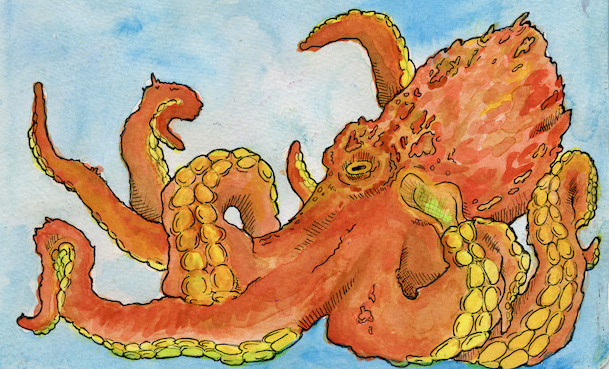
Another wonderful work by the offspring.


Another wonderful work by the offspring.

I put up this beautiful image, gifted to me by my daughter, on prominent display in my office. A sunwashed corner of a high-rise. Where I failed – I failed – was to understand that during my extended COVID induced absence from the office, the sunshine would wash this rich and wonderful drawing to a barely visible outline. I was on the verge of tears at what I had done (or failed to do). What you see above is a partial restoration courtesy of a high resolution scan and Adobe Lightroom. Still working on it.
“If we are to have another contest in the near future of our national existence, I predict that the dividing line will not be Mason’s and Dixon’s, but between patriotism and intelligence on one side, and superstition, ambition, and ignorance on the other.”
– Ulysses S. Grant, 1875
I spotted this big beautiful pileated woodpecker (Dryocopus pileatus) a few weeks ago in Pacific Spirit Park, probing through the rotting bark for ants and other insects. How do these animals not get the worst headaches?
Why don’t woodpeckers pound themselves into brain trauma? From Ask a Biologist:
Woodpeckers are better than hoopoes at varying the path of their pecks. By moving their beaks around more, woodpeckers minimize brain damage in specific areas.
Woodpeckers’ skulls are more flexible because of the plate-like bones. That helps to minimize the damage of all that pecking.
Woodpeckers have a special bone that acts like a seat-belt for its skull. It’s called the hyoid bone, and it wraps all the way around a woodpecker’s skull. Every time the bird pecks, the hyoid acts like a seat-belt for the bird’s skull and the delicate brain it protects.
Even the woodpeckers’ beak helps. A woodpecker’s upper beak is longer than its lower beak, kind of like an overbite. The lower beak is also made of stronger bone to help absorb impact.
“I am certainly not an advocate for frequent and untried changes in laws and constitutions. I think moderate imperfections had better be borne with; because, when once known, we accommodate ourselves to them, and find practical means of correcting their ill effects. But I know also, that laws and institutions must go hand in hand with the progress of the human mind. As that becomes more developed, more enlightened, as new discoveries are made, new truths disclosed, and manners and opinions change with the change of circumstances, institutions must advance also, and keep pace with the times. We might as well require a man to wear still the coat which fitted him when a boy, as civilized society to remain ever under the regimen of their barbarous ancestors.” – Thomas Jefferson, July 12, 1816

autumn in Pacific Spirit Park, Vancouver
I encourage everyone to see this beautiful documentary, My Octopus Teacher. It follows a South African photographer, Craig Foster, as he copes with depression by free diving the local coast and forming a bond with a an unexpectedly charismatic common octopus (Octopus vulgaris). He visits daily for nearly a year, filming her nesting and playing, hunting and being hunted, gaining her trust and contact. The visuals are beautiful – the South African kelp forests could as easily pass for my own Pacific coast.
An octopus is clever – curious and playful (the scene of her playing with fish brought tears to my eyes). It fascinates me how this intelligence grew on a limb distinct and separate from us and our mammal cousins. Where we share kinship with the chimpanzee and dolphin, the octopus in her phylum is kith and kin with with snails, clams, and sea slugs.
I didn’t know what to expect when I started watching. What I got was a captivating dive into a life alien and wonderful.
Seems appropriate right now.
Turning and turning in the widening gyre
The falcon cannot hear the falconer;
Things fall apart; the centre cannot hold;
Mere anarchy is loosed upon the world,
The blood-dimmed tide is loosed, and everywhere
The ceremony of innocence is drowned;
The best lack all conviction, while the worst
Are full of passionate intensity.
Surely some revelation is at hand;
Surely the Second Coming is at hand.
The Second Coming! Hardly are those words out
When a vast image out of Spiritus Mundi
Troubles my sight: somewhere in sands of the desert
A shape with lion body and the head of a man,
A gaze blank and pitiless as the sun,
Is moving its slow thighs, while all about it
Reel shadows of the indignant desert birds.
The darkness drops again; but now I know
That twenty centuries of stony sleep
Were vexed to nightmare by a rocking cradle,
And what rough beast, its hour come round at last,
Slouches towards Bethlehem to be born?
– W.B. Yeats, 1919
